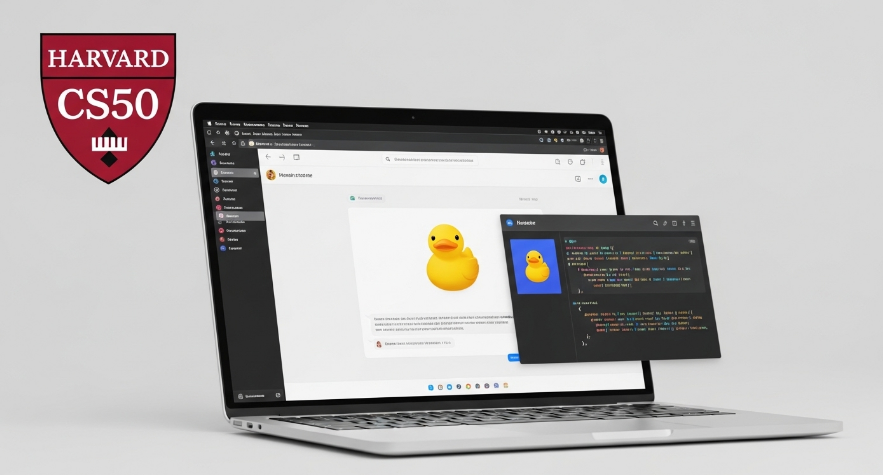As AI tools like ChatGPT grow in popularity, students in Harvard’s CS50 course often ask: Can CS50 detect if I use ChatGPT? This article answers that question, exploring CS50’s policies on AI, how its approved AI tool—the CS50 Bot—works, and tips for staying within the rules. Written in clear, simple language, this guide offers practical advice for students aiming to succeed in CS50 while maintaining academic integrity. All information is verified as of July 2025.
Does CS50 Have Tools to Detect ChatGPT?
CS50, Harvard’s introductory computer science course, does not have a specific tool designed to detect ChatGPT use. However, its academic honesty policy strictly prohibits using third-party AI tools like ChatGPT for assignments. The course relies on a combination of manual reviews and software to compare student submissions for similarities, primarily to detect plagiarism between students. The course uses software to perform pairwise comparisons of code submissions, which could potentially flag unusual patterns, but there’s no evidence of a dedicated AI detection tool targeting ChatGPT. While ChatGPT can solve CS50 problem sets quickly, instructors may notice inconsistencies in a student’s work, such as advanced code from beginners, which could raise suspicion.
Key Points:
- No specific ChatGPT detection tool exists in CS50.
- Code similarity software is used to detect plagiarism.
- Instructors may manually spot AI use through inconsistent coding styles.

What is CS50’s Policy on AI Tools?
CS50’s academic honesty policy clearly states that using third-party AI tools, including ChatGPT, GitHub Copilot, or similar software, to generate answers or code for assignments is not allowed. The policy emphasizes that all submitted work must be your own, and relying on external AI undermines the course’s goal of teaching problem-solving and coding skills. However, CS50 encourages the use of its own AI tool, the CS50 Bot (also called the Duck Debugger), which is designed to assist students without providing direct solutions. The CS50 Bot was introduced in 2023 to about 70 summer students and has since expanded to support thousands online and on campus.
Why It Matters: Using ChatGPT risks violating academic honesty, which could lead to penalties like failing an assignment or the course. Stick to approved tools to avoid issues.
What is the CS50 Bot, and How Does It Work?
The CS50 Bot, or Duck Debugger, is a conversational AI tool built for CS50 students. Unlike ChatGPT, which may provide full solutions, the CS50 Bot is designed to offer hints, explain errors, and guide students toward answers without doing the work for them. The CS50 Bot uses large language models (LLMs) like GPT-3.5 or GPT-4 but is fine-tuned to provide pedagogical support, such as:
- Explaining complex error messages in simple terms.
- Suggesting ways to improve code without writing it.
- Answering questions about course concepts.
Students access the CS50 Bot via cs50.ai. Some students finding it less user-friendly than ChatGPT but appreciating its focus on learning over solutions.

Why Can’t You Use ChatGPT in CS50?
Using ChatGPT for CS50 assignments violates the course’s academic honesty policy because it bypasses the learning process. CS50 aims to teach students how to think like programmers, which requires solving problems independently. Relying on ChatGPT for solutions can create a dependency, hindering skill development. For example, ChatGPT might generate correct code in seconds, but without understanding the logic, students may struggle with later assignments or the final project.
Consequences of Using ChatGPT:
- Penalties: Submitting AI-generated work could result in failing an assignment or the course.
- Missed Learning: You won’t gain the skills needed for advanced programming tasks.
- Ethical Concerns: Using ChatGPT undermines the integrity of your CS50 certificate.
How to Use AI Ethically in CS50
To succeed in CS50 while staying within the rules, use approved resources like the CS50 Bot and course materials. Here are practical tips:
- Ask the CS50 Bot for Help: Use prompts like “Explain this error” or “What does this function do?” to get guidance without solutions.
- Use Course Resources: Lectures, shorts, and notes on cs50.harvard.edu cover all necessary concepts.
- Join Discussion Forums: Platforms like Reddit’s r/cs50 or Ed Discussion let you ask peers for advice without copying solutions.
- Attend Office Hours: Teaching assistants can clarify concepts and debug code ethically.
A Reddit user shared that they used ChatGPT to isolate errors but switched to the CS50 Bot after learning it was the approved tool, showing how students can adjust to stay compliant.
How to Humanize ChatGPT Content – Learn how to use AI tools ethically in other contexts.
Common Questions About AI in CS50
| Question | Answer |
|---|---|
| Can I use ChatGPT to learn concepts? | You can research concepts using Google or course materials, but avoid using ChatGPT for assignments. Use the CS50 Bot instead. |
| What if I use ChatGPT for debugging? | Even debugging with ChatGPT risks violating policy if it suggests code. Use the CS50 Bot for safe debugging. |
| How effective is the CS50 Bot? | It’s designed to guide without giving answers, making it ideal for learning. Some find it less intuitive than ChatGPT but more ethical. |
| What happens if I’m caught using ChatGPT? | You could face penalties like failing an assignment or the course, per CS50’s policy. |

Alternatives to ChatGPT for CS50 Success
Instead of risking academic dishonesty, rely on CS50’s approved resources:
- CS50 Bot: Access it at cs50.ai for tailored guidance.
- Course Materials: Lectures, shorts, and problem set instructions are comprehensive.
- Community Support: Engage with peers on Reddit’s r/cs50 or Ed Discussion.
- Official Documentation: Use sites like man.cs50.io for C library references.
These resources ensure you learn effectively while staying within CS50’s rules. For more on AI detection in other platforms, check our post on Can Canvas Detect ChatGPT?.
Why Academic Honesty Matters in CS50
CS50’s focus on academic honesty ensures students gain real programming skills. Using ChatGPT might offer quick solutions, but it prevents you from mastering problem-solving, which is critical for a computer science career. The course’s “regret clause” allows students to report policy violations within 72 hours for leniency. This shows CS50 values learning over punishment, but repeated violations can lead to strict consequences.
Conclusion
CS50 does not have a specific tool to detect ChatGPT use, but its academic honesty policy bans third-party AI tools for assignments. The CS50 Bot offers a safe, ethical alternative, guiding students without providing solutions. By using approved resources like the CS50 Bot, course materials, and community forums, you can succeed in CS50 while building valuable skills. Stay honest, work hard, and let CS50 prepare you for a future in computer science.
